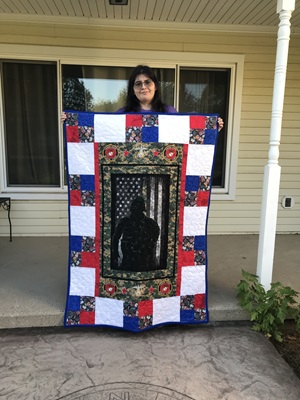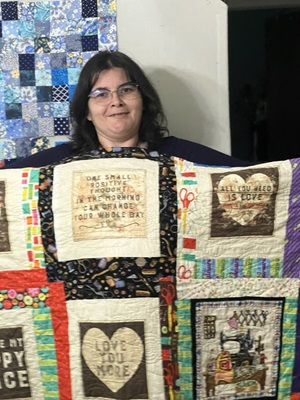Debilitating seizures dramatically deduced with RNS treatment at Henry Ford
Gil Martinez, of Rochester Hills, recalls his daughter Jacque was only 18 months old when tragic circumstances affected her and her family. “My sister died in a car accident and when we went to pick up Jacque at my in-laws we could tell she was excited to see us. Then, she fell backward. We spent the next 48 hours in the ICU because she had suffered a grand mal seizure,” Gil says.
 Jacque’s seizure, characterized by a sudden loss of consciousness, muscle stiffening and rhythmic jerking, lasted for approximately 10 hours and was the first major episode she experienced. Since then, Jacque, who is now 45, spent most of her life dealing with recurring seizures that affected most aspects of her life.
Jacque’s seizure, characterized by a sudden loss of consciousness, muscle stiffening and rhythmic jerking, lasted for approximately 10 hours and was the first major episode she experienced. Since then, Jacque, who is now 45, spent most of her life dealing with recurring seizures that affected most aspects of her life.
“She would have a tendency to stare off into space, which was an indication that she was having a seizure,” her dad remembers. Seizure medications she used as a child caused side effects, including short term memory loss that affected her school performance. So Gil, a retired engineer from General Motors, began monitoring and producing a report to help doctors determine what may have been triggering her seizures.
“Although the episodes initially subsided when she was younger, we found that later, as a teenager, her menstrual cycle and any kind of stress or emotion could trigger a seizures.”
Life altering car accident caused by seizure
At age 19, during college, Jacque was involved in a major car accident caused by a grand mal seizure, robbing her of the ability to safely drive or maintain steady employment. “Although I survived, it really took a toll, greatly affecting my quality of life” Jacque says.
Multiple tests at different hospitals yielded limited information. But that changed when she was referred to the Henry Ford Epilepsy Center, where a collaborative team of experts approached her care comprehensively.
Jacque was monitored for 18 days in Henry Ford Hospital’s Epilepsy Monitoring Unit. That’s where epilepsy specialists were, for the first time, able to develop a full picture of what was causing her seizures, along with options for treatment. “They were able to determine that she was also having panic attacks, which could trigger the focal seizures (short seizures often lasting a few seconds) which would then lead to generalized convulsive seizures,” her dad explains.
Advanced neurostimulation technology provides long-awaited relief
The epilepsy team at Henry Ford determined that Jacque was a good candidate for a treatment called responsive neurostimulation (RNS), a surgically implanted device to treat seizures. Similar to a pacemaker, the device sends an electrical impulse to a targeted area of the brain to prevent seizures. Vibhangini S. Wasade, MD, a neurologist at the Henry Ford Epilepsy Center, says patients do not feel the stimulation once it’s programmed. For Jacque, RNS was a game changer in reducing her seizures.

“Jacque’s clinical history is quite unique,” says Dr. Wasade. “She experienced febrile seizures during childhood—a known risk factor for epilepsy—and was at one point thought to have panic attacks and non-epileptic events. Despite trying multiple anti-seizure medications, her episodes remained resistant to anti-seizure medications. She ultimately chose to pursue more advanced diagnostic testing.”
Jacque’s case was thoroughly reviewed at the Henry Ford Epilepsy Surgery Conference, a multidisciplinary board comprised of epileptologists, neurosurgeons, neurologists, and neuropsychologists who meet regularly to determine the best course of treatment for complex cases. The results of her testing indicated the need for intracranial EEG monitoring to better localize seizure activity.
This proved to be a turning point, according to Dr. Wasade. “The monitoring revealed that she had distinct types of seizures originating independently from both the right and left sides of her brain. In 2018, she underwent implantation of a responsive neurostimulation (RNS) device, with leads placed to target both seizure-onset areas.”
Since the RNS implantation, Jacque has experienced a dramatic reduction in her seizure frequency and is now able to participate in many activities that were previously limited by her condition.
“I went from experiencing almost 75 seizures in a 3-4 month period to now having less than 5 seizures in that same time frame, Jacque says. “It has been a life-changer.”

Today, Jacque fills her time with quilting, gardening and volunteering. She works with her therapy dog and participates in her church’s grief counseling ministry -- activities she couldn’t previously enjoy without the fear of a seizure.
“Since the procedure, my cognitive abilities have improved and I can better plan for activities like shopping or volunteering. It’s allowed me to enjoy and plan for life activities with less disruptions from the seizures.”
Spreading the word to help others with seizures
Jacque has shared her seizure treatment and experience in the community to help others. “Every chance I get, I tell others who are dealing with seizures to seek out treatment at Henry Ford. I love the coordinated team approach to communication from all the seizure experts including psychology and physical therapy. They are a very well-oiled machine!”
For further information on a personalized path for treatment visit RNS and Epilepsy Surgery at Henry Ford Health.
.svg?iar=0&hash=F6049510E33E4E6D8196C26CCC0A64A4)

/hfh-logo-main--white.svg?iar=0&hash=ED491CBFADFB7670FAE94559C98D7798)